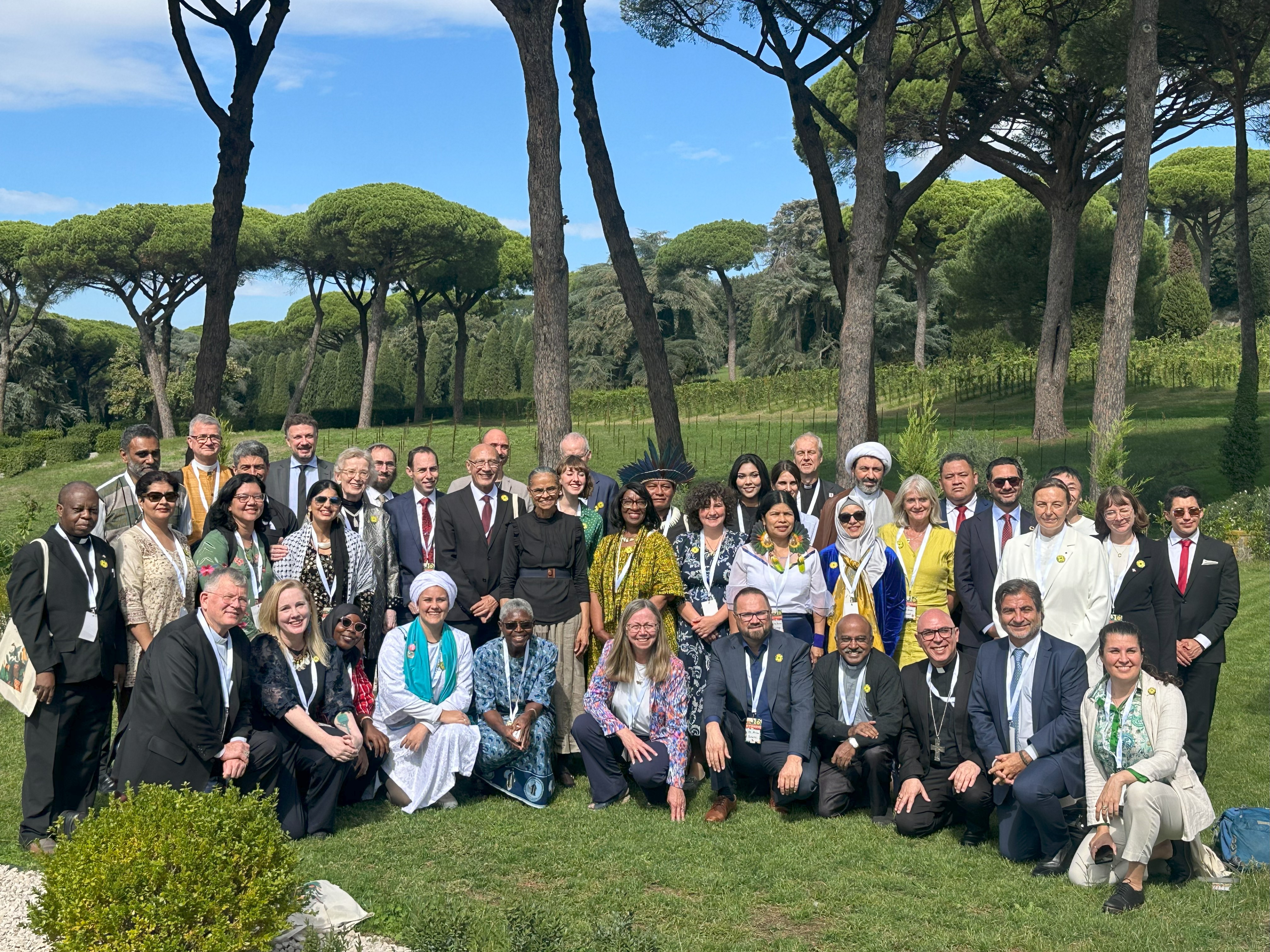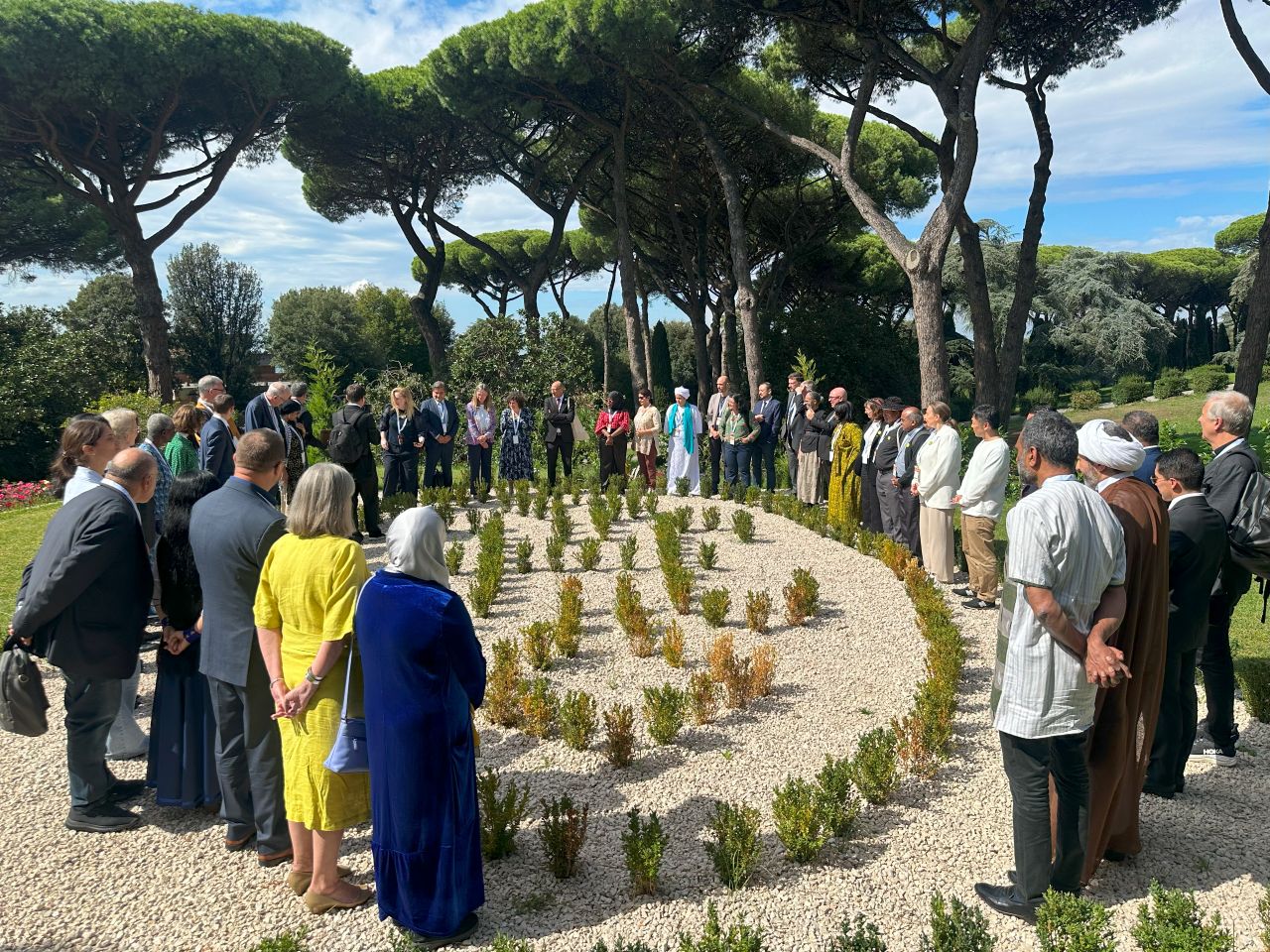In the Vatican, Global Ethical Stocktake, religious and spiritual leaders discuss tackling climate change
Based on Pope Francis's encyclical Laudato Si', the Vatican meeting highlighted the role of religions in intensifying the global collaborative effort for climate action, which is at the core of COP30

By MMA
More than 30 religious and spiritual leaders from around the world gathered at the Borgo Laudato Si', a space created by the Vatican, in Castel Gandolfo, Italy, last Wednesday, October 1, to discuss how different forms of faith can contribute to intensifying global measures to tackle climate change.
The discussions took place within the framework of the Global Ethical Stocktake (GES), one of the instruments through which COP30, the UN Climate Change Conference, taking place in Belém, Pará, in November, mobilizes society to create a worldwide collaborative effort for climate action. Marina Silva, the Minister of Environment and Climate Change, participated in the dialogue, which was promoted by Green Faith, Women Faith and Climate Network, Dandelion and Laudato Si' Movement, dedicated to disseminating and applying the principles of the 2015 encyclical published by Pope Francis, which calls on humanity to collaborate in building and preserving the common home and to join efforts in combating the climate crisis.
Led by President Luiz Inácio Lula da Silva and UN Secretary-General António Guterres, the GES offers reflections on ethics and culture to discuss how far we have advanced and the paths that still need to be taken to ensure that the planet does not exceed the 1.5°C average warming threshold relative to pre-industrial levels, the primary objective of the Paris Agreement. The GES discusses the reasons why the gap persists between scientific recommendations and our actual efforts to combat the root causes of global warming.
This initiative stemmed from Regional Dialogues held from June to October across all continents, as well as Self-Managed Dialogues promoted by various sectors and civil society movements in different countries. One such dialogue was held at the Vatican. There, leaders of various faiths, including Catholic, Protestant, Muslim, Indigenous, African-matrix, and Jewish, engaged in respectful dialogue that simultaneously highlighted the shared goal of caring for the common home and the diverse forms of life inhabiting it.
Minister Marina Silva pointed out that humanity is experiencing a challenging geopolitical context, marked by the increasing climate change impacts and military and trade wars. "The contribution of religions at this moment is very important," she stated. "Much of what we do is motivated by the ethics of circumstance, but it should be based on the ethics of values. Saying we love the Creator and then destroying creation is completely incoherent." She believes that the "Global Ethical Stocktake demonstrates the unethical nature of making commitments and failing to honor them. Over the three decades of the UN Framework Convention on Climate Change's existence, many decisions have been made but not implemented."
Former President of Ireland and GES co-leader for Europe, Mary Robinson, emphasized that the initiative has served as a space for people to express themselves freely and fully both in community and individually. She advocated that the ideas presented during the process inspire the creation of People-Determined Contributions (PDCs), in contrast to the Nationally Determined Contributions (NDCs), which outline countries' greenhouse gas emission reduction targets under the Paris Agreement. "The NDCs are not ambitious enough; they don't put us on the right trajectory. But the people who have been building this Ethical Balance will show that, when they are heard, they make a difference," she said.
Lorna Gold, Executive Director of the Laudato Si' Movement, highlighted that the GES is a way to bring "ethics, morality, and spirituality to COP30," in line with Pope Francis's proposals in the encyclical.
The dialogue took place on the eve of the opening of the "Raising Hope" conference, held by the Vatican to celebrate the tenth anniversary of Laudato Si'. Pope Leo XIV and Marina Silva spoke at the ceremony, and shortly before, they met briefly, an opportunity during which Marina Silva reiterated President Luiz Inácio Lula da Silva's invitation for the pontiff to participate in COP30 (read more here).
Road to COP30

The GES begins with the idea that humanity already has the technical solutions necessary for ecological transformation; what is lacking is the ethical commitment to implement these solutions. The goal is to identify ways to achieve this, envisioning a sustainable and prosperous future based on modern science, the traditional knowledge of indigenous peoples and communities, and climate solutions practiced worldwide.
The central reference is the resolutions of the United Arab Emirates Consensus, agreed at COP28 following the first Global Stocktake of the Paris Agreement. Through this deal, nearly 200 countries committed to tripling renewable energy, doubling efficiency, halting deforestation, and charting a fair, orderly, and equitable path toward the phaseout of fossil fuels.
The results of discussions from each of the Regional Dialogues have been consolidated into regional reports, which will serve as the basis for a synthesis report to be delivered to the COP30 Presidency, President Lula, and UN Secretary-General António Guterres at the Pre-COP this month in Brasília, to inform the climate negotiations at the conference.
English version: Trad. Bárbara Menezes.
Proofreading by Enrique Villamil.
